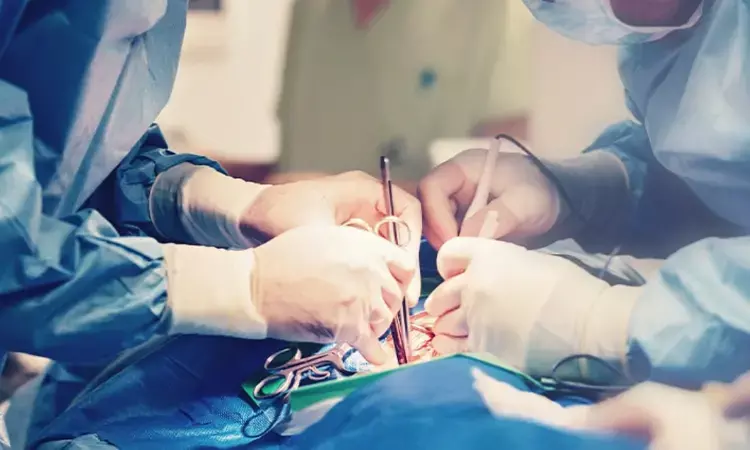- Home
- Medical news & Guidelines
- Anesthesiology
- Cardiology and CTVS
- Critical Care
- Dentistry
- Dermatology
- Diabetes and Endocrinology
- ENT
- Gastroenterology
- Medicine
- Nephrology
- Neurology
- Obstretics-Gynaecology
- Oncology
- Ophthalmology
- Orthopaedics
- Pediatrics-Neonatology
- Psychiatry
- Pulmonology
- Radiology
- Surgery
- Urology
- Laboratory Medicine
- Diet
- Nursing
- Paramedical
- Physiotherapy
- Health news
- Fact Check
- Bone Health Fact Check
- Brain Health Fact Check
- Cancer Related Fact Check
- Child Care Fact Check
- Dental and oral health fact check
- Diabetes and metabolic health fact check
- Diet and Nutrition Fact Check
- Eye and ENT Care Fact Check
- Fitness fact check
- Gut health fact check
- Heart health fact check
- Kidney health fact check
- Medical education fact check
- Men's health fact check
- Respiratory fact check
- Skin and hair care fact check
- Vaccine and Immunization fact check
- Women's health fact check
- AYUSH
- State News
- Andaman and Nicobar Islands
- Andhra Pradesh
- Arunachal Pradesh
- Assam
- Bihar
- Chandigarh
- Chattisgarh
- Dadra and Nagar Haveli
- Daman and Diu
- Delhi
- Goa
- Gujarat
- Haryana
- Himachal Pradesh
- Jammu & Kashmir
- Jharkhand
- Karnataka
- Kerala
- Ladakh
- Lakshadweep
- Madhya Pradesh
- Maharashtra
- Manipur
- Meghalaya
- Mizoram
- Nagaland
- Odisha
- Puducherry
- Punjab
- Rajasthan
- Sikkim
- Tamil Nadu
- Telangana
- Tripura
- Uttar Pradesh
- Uttrakhand
- West Bengal
- Medical Education
- Industry
Delaying Surgery for at least seven weeks after COVID-19 diagnosis reduces mortality risk: Study

New international research published in Anaesthesia (a journal of the Association of Anaesthetists) concludes that surgery should be delayed for seven weeks after a patient tests positive for SARS-CoV-2, since the data show that surgery that takes place between 0 and 6 weeks after diagnosis is associated with increased mortality.
The study is by the COVIDSurg Collaborative: a global collaboration of over 15,000 surgeons working together to collect a range of data on the COVID-19 pandemic. This study's lead authors are Dr Dmitri Nepogodiev (Public Health) and Dr Aneel Bhangu (Surgeon) of the University of Birmingham, UK.
While it is known that infection with SARS-CoV-2 during surgery increases mortality and international guidelines recommend surgery should be delayed for patients testing positive for COVID-19, there is little evidence regarding the optimal duration of delay.
This international multicentre study included 140,231 patients (1,674 hospitals, 116 countries)* undergoing surgery in October 2020. Participating hospitals included all patients undergoing a surgical procedure. The number of co-authors (more than 15,000) makes this the largest collaborative surgery study ever undertaken globally.
Patients who became infected with SARS-CoV-2 after their surgery were excluded from the study. The primary outcome measure was 30-day postoperative death. Statistical modelling was used to adjust for patient, disease, and operation variables and calculate adjusted 30-day mortality rates for different time periods from SARS-CoV-2 diagnosis to surgery.
The time from SARS-CoV-2 diagnosis to surgery was 0-2 weeks in 1,144 (0.8%) patients, 3-4 weeks in 461 (0.3%), 5-6 weeks in 327 (0.2%), 7 weeks or more in 1,205 (0.9%), and 137,590 (97.8%) patients did not have SARS-CoV-2 infection. Adjusted 30-day mortality in patients who did not have SARS-CoV-2 infection was 1.5%. This was increased in patients operated at 0-2 weeks (4.0%), 3-4 weeks (4.0%), and at 5-6 weeks (3.6%), but not at 7-8 weeks (1.5%) after SARS-CoV-2 diagnosis.
These findings were consistent across age groups, patient fitness levels, urgency (elective versus emergency) of surgery, and grade (minor versus major) of surgery. Following a delay of 7 weeks or more, patients with ongoing COVID-19 symptoms (6.0%) had higher mortality than patients whose symptoms had resolved (2.4%) or who had been asymptomatic (1.3%).
Dr Dmitri Nepogodiev says: "We found that patients operated 0-6 weeks after SARS-CoV-2 infection diagnosis are at increased risk of postoperative death, as were patients with ongoing symptoms at the time of surgery. We recommend that whenever possible surgery should be delayed for at least 7 weeks after a positive SARS-CoV-2 test result, or until symptoms resolve if patients have ongoing symptoms for 7 weeks or more after diagnosis."
Dr Aneel Bhangu adds: "Decisions regarding delaying surgery should be tailored for each patient, since the possible advantages of delaying surgery for at least 7 weeks following SARS-CoV-2 diagnosis must be balanced against the potential risks of delay. For some urgent surgeries, for example for advanced tumours, surgeons and patients may decide that the risks of delay are not justified."
Dr Mike Nathanson, President of the Association of Anaesthetists, said "This paper provides important information to patients and their carers and will help them determine the right time for surgery after a COVID-19 infection. Of the millions of patients now waiting for surgery, many will have had COVID-19 and they will want to be informed about the risks. COVID-19 will be with us for many years and the number of patients with a previous infection will continue to increase."
Dr Kamal Kant Kohli-MBBS, DTCD- a chest specialist with more than 30 years of practice and a flair for writing clinical articles, Dr Kamal Kant Kohli joined Medical Dialogues as a Chief Editor of Medical News. Besides writing articles, as an editor, he proofreads and verifies all the medical content published on Medical Dialogues including those coming from journals, studies,medical conferences,guidelines etc. Email: drkohli@medicaldialogues.in. Contact no. 011-43720751


